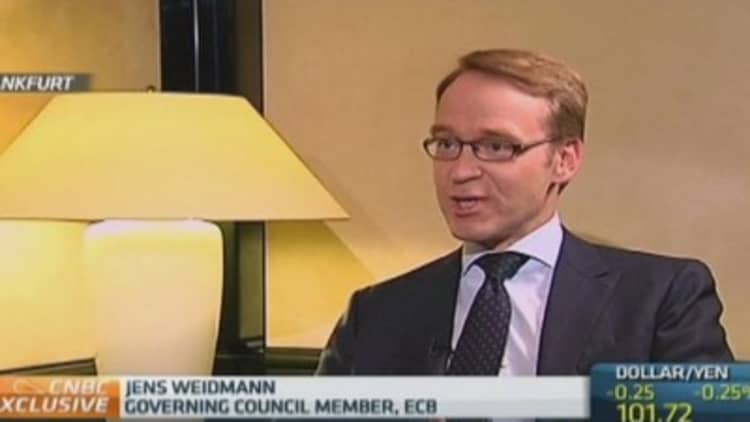
The European Central Bank (ECB) reaffirmed that it is ready to use "unconventional instruments" if euro zone inflation remains stubbornly low, but also said the expectation is inflation will gradually rise over the future.
Bundesbank chief Jens Weidmann, who is also a member of the ECB's governing council, played down any risk of deflation, putting the slowing price growth currently witnessed down to factors "outside" the ECB's control.
Read MoreECB 'really concerned' on inflation: Vice-President
"Mario Draghi made this point pretty clear in his last press conference. We do believe that the deflationary risks are pretty limited so we portray an outlook for the inflation rates that expects a gradual recovery and this recovery will also be reflected in gradually rising inflation rates," Weidmann told CNBC.
"The governing council said if there is a too prolonged period of low inflation rates it will also consider unconventional instruments," he said.
Hawkish Weidmann, who as president of Germany's central bank sits on the ECB's 24-member Governing Council, refused to go into detail on what kind of measures the bank would take in the event of prolonged low euro zone inflation and added the bank also needed to consider the limits of it mandate.
Read MoreDraghi hits back at IMF as ECB holds fire
Weidmann is due to meet with the International Monetary Fund (IMF) in Washington for the IMF and World Bank Group meeting kicking off on Friday.
The ECB has fended off criticism from the IMF, which has been vocal in its concerns over the risks of deflation and has called for monetary easing in the euro zone.
"There is of course a debate about the economic outlook and this [the IMF's suggestion of using monetary easing] was a contribution to that debate, but there are also diverging views about the risks to that outlook, I think we have to discuss those and we will certainly do so in Washington," said Weidmann.
Last week, the ECB opted to hold its key interest rate at 0.25 percent, as well as keep the rate on its deposit facility at zero.
Read More IMF calls on ECB to act amid 'low-flation'
This was despite calls from the likes of the International Monetary Fund for the bank to combat rapidly falling inflation and keep the recovery on track. Official data showed that euro zone inflation slipped to a 52-month low of 0.5 percent in March.
ECB Vice President Vitor Constancio told CNBC from the Ambrosetti Forum in Italy that the bank was very worried about low inflation despite failing to take action.
"Concern has been increasing, because we are quite a number of months with inflation below 1 percent and that is certainly a problem," he said.
"We are really concerned with the regime of low inflation," he added.



